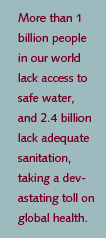













|
 |

 |
 Water's
impact on global health Water's
impact on global health
 n
September of 1854, as a deadly cholera epidemic was sweeping through
London, scientist John Snow began mapping the outbreak of new cases.
He noticed an interesting cluster of 500 cases contracted near a
public pump at Broad and Cambridge Streets in the SoHo District.
Snow's hypothesis that contaminated water from the pump was causing
the disease was confirmed when he removed the pump handle and the
epidemic abated. n
September of 1854, as a deadly cholera epidemic was sweeping through
London, scientist John Snow began mapping the outbreak of new cases.
He noticed an interesting cluster of 500 cases contracted near a
public pump at Broad and Cambridge Streets in the SoHo District.
Snow's hypothesis that contaminated water from the pump was causing
the disease was confirmed when he removed the pump handle and the
epidemic abated.
It has been 150 years since Snow's
use of epidemiology to save lives, but these 150 years later, we
are still experiencing the devastating health effects of drinking
contaminated water. More than 1 billion people in our world lack
access to safe water and 2.4 billion lack adequate sanitation, taking
a devastation toll on global health. Despite the efforts of governments,
international nonprofit agencies, and private organizations, the
problem persists.
Underlying the lack of safe water
are poverty and inequality. Our public health programs require concomitant
attention to economic development. Likewise, our programs will fail
if they lack comprehensiveness. They need multiple approaches—from
digging wells to providing point-of-use strategies to educating
people in the developing world on hygiene and health. Finally, our
efforts need a coalition of partners to bring multidisciplinary,
diverse perspectives working together to get fresh ideas and literal
water flowing to all people.
At the Rollins School of Public Health,
a new Center for Global Safe Water is drawing talent and support
for global water safety from across Emory University and government
and private organizations. Center faculty members are engaged in
applied research that can make a differece in the quality of water
and its effect on health. Partnerships with CDC, CARE, Population
Services International, the Rotary Club of Atlanta, and others are
getting our findings, expertise, and evaluations to train the next
generation of water researchers and policy makers through our Global
Environmental Health program.
The pledge of two new chairs in water
and sanitation by Eugene J. Gangarosa, professor emeritus of international
health and former director of Emory's Public Health Program, and
his wife, Rose Salamone Gangarosa, is contributing to the synergy
building around safe water issues at the school. These chairs will
nurture our collaborative efforts in safe water and sanitation and
enrich the education of students in international potential in this
important area. Gifts, teamwork, knowledge, evaluation—together
they'll create momentum to answer this core public health challenge.
 |
 |
| |
|
|
| |
|
|
|
|
|
|



